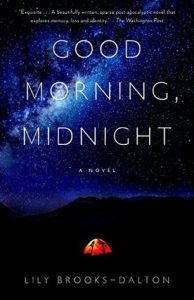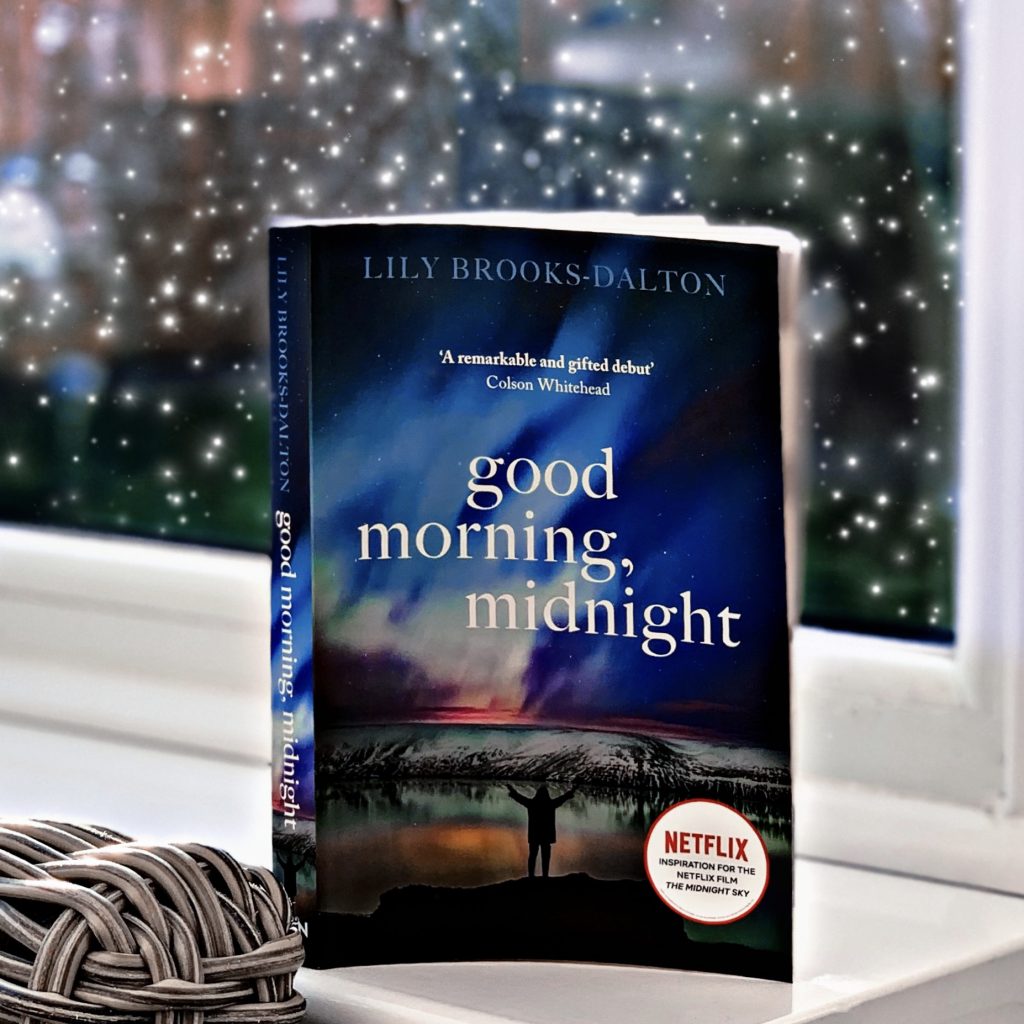Good Morning, Midnight by Lily Brooks-Dalton – Book Review
Everything was so much clearer in space: stars, sounds, the entire electromagnetic spectrum coming alive all around her, like seeing fireflies dance in a dark meadow for the first time. Without the interference of Earth everything seemed different. Sharper. More dangerous, more violent, and also more beautiful.
 Good Morning, Midnight is the stunning debut by Lily Brooks-Dalton. This is a sci-fi dystopia, revolving around two central characters – Augustine who is left behind in the remote Arctic Circle, and Sully who along with five other astronauts is stranded on the Aether spaceship. It is unknown what has happened to the rest of civilization but for many weeks both characters experience complete radio silence from the rest of the world and therefore assume a catastrophic event has occurred.
Good Morning, Midnight is the stunning debut by Lily Brooks-Dalton. This is a sci-fi dystopia, revolving around two central characters – Augustine who is left behind in the remote Arctic Circle, and Sully who along with five other astronauts is stranded on the Aether spaceship. It is unknown what has happened to the rest of civilization but for many weeks both characters experience complete radio silence from the rest of the world and therefore assume a catastrophic event has occurred.
Augustine or Augie as he’s often called, is a renowned scientist, a man with a legacy of great achievements, one who has led a colourful life. Yet where our story begins, Augustine is ageing, in poor health, and arthritic. He displays little fondness for humanity and has resolved to spend the remainder of his life in The Barbeau Observatory research station in the Arctic, isolated and alone. Or so he thinks until he finds a mysterious child called Iris.
Throughout the novel, we examine Augustine’s life as he reflects upon his troubled childhood where his mother fell into the depths of depression and his abusive father made him withdraw into the world of science. It was in this world filled with complex puzzles and discoveries waiting for him to explore where Augustine really began to shine. His scientific success propelled him into a life of relative fame where he then engaged in many frivolous relationships. Now that Augustine’s youth is far behind him, he looks back on his life and questions whether the choices he made were indeed the right ones?
Yet here he was, seventy-eight years old, at the top of the Arctic archipelago, on the rind of civilization—and, having come to the terminus of his life’s work, all he could do was stare into the bleak face of his own ignorance.
Sully, our second main protagonist, along with five other members of the Aether crew – Devi, Harper, Thebes, and Tal, are on a return mission from Jupiter. They have already been onboard the spacecraft for two years and are the first humans to delve so deeply into space. However their journey takes a daunting turn when they fail to communicate with Mission Control. As they continuously attempt to communicate with NASA or even any living soul back on Earth, the realisation that something dreadful has happened begins to take its toll. Sully begins to look back at her life, to long for the daughter she left behind, and like Augustine, she too begins to question which were the moments that really mattered? Was a life in Space really worth losing all the milestones with her daughter, Lucy?
She wanted to remember how it felt to be held by Earth: dirt and rocks and grass cradling the soles of her feet. The season’s first snow, the smell of the ocean, the silhouette of pine trees.
Here is where the beauty of Good Morning, Midnight lies, it is a poignant reflection upon the bonds which we make in life, the paths we take and the mistakes we live to regret. The narrative is a slow burn throughout, so if you’re expecting an action packed space romp where the characters rush to save humanity, then you’ll be sorely disappointed. However the story Dalton presents to us is far more thought-provoking and so very emotional; these characters are the last of humanity and through the snapshots of their lives, we learn what it is that makes us human.
Dalton portrays her characters facing isolation and loneliness, and explores the physiological impact those circumstances have. We witness that when all else fails, the only solace a person really has left is in their memories and that is the story which Dalton gives us here. The book is full of what ifs and is filled with regrets. I love the way Dalton makes us think – how much of life means anything if by the end you’re left alone with only meaningless encounters to look back on? We see that the young girl, Iris, reminds Augustine of the important things in life, in the beauty and wonderment of nature, in companionship, in love. Both Augustine and Sully come to realise their life’s ambitions and their legacies have now become inconsequential because there is no one left to remember them.
One of the aspects I loved most of Good Morning, Midnight was Dalton’s immensely stunning prose. The prose triumphs in the way it reflects the stillness and the silence of this barren world. Dalton vividly captures the landscape and wildlife of the Arctic, the overwhelming vastness of Space. There is an ominous atmosphere throughout and a deeply melancholic tone which kept me turning the page. This is the end of the world, but it doesn’t end with a bang.
They sat in silence and listened to the ice. A wolf howled somewhere far away, and then another answered from the other side of the lake. Still they sat. Full darkness settled and a snowy owl swooped overhead, landing on one of the antenna poles, where it watched the two humans with curiosity. Stars began to prickle in the sky above them.
As we reach the climax of the novel we come to realise that much is going to be left unanswered. At first I was disappointed by this but in hindsight, I feel the focal point of this story is in the personal journey these characters make and not in what happens next. It is a tender story which stays with you well after you have closed the book, and it is a truly brilliant read.
Review copy provided by Kate Moreton and W & N Books in exchange for an honest review. Thank you for the copy.
Good Morning, Midnight is out now. It has also been adapted into a Netflix film called Midnight Sky, although unfortunately I wasn’t very impressed by it.

